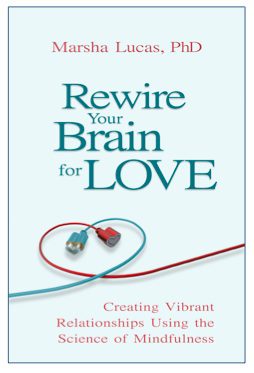 In the spirit of Valentine’s Day, I thought I’d feature an interview with a very cool licensed psychologist and neuropsychologist that I was lucky enough to meet in person at a book signing back in September. Marsha Lucas, Ph.D., has been practicing psychotherapy and studying the brain-behavior relationship for over twenty years. Prior to entering private practice, she was a neuropsychologist on the faculty at the Emory University School of Medicine. In other words, she was probably one of those persons in grade school that was taken aside and given more challenging work, while the rest of us (at least the one writing this blog) struggled through the regular assignments.
In the spirit of Valentine’s Day, I thought I’d feature an interview with a very cool licensed psychologist and neuropsychologist that I was lucky enough to meet in person at a book signing back in September. Marsha Lucas, Ph.D., has been practicing psychotherapy and studying the brain-behavior relationship for over twenty years. Prior to entering private practice, she was a neuropsychologist on the faculty at the Emory University School of Medicine. In other words, she was probably one of those persons in grade school that was taken aside and given more challenging work, while the rest of us (at least the one writing this blog) struggled through the regular assignments.
Her newest book, “Rewire Your Brain for Love,” is a fascinating read because she delves into how the human brain works – or fumbles – in relationships. In other words, she explores how we developed our current relationship wiring, and, if part of that is contributing to toxic relationships, how to modify it through mindfulness meditation. Lucas shows how a short meditation practice can result in seven key relationship benefits, including communication with yourself and others, an enhanced ability to handle fear, and being more emotionally authentic and resilient.
I have to be honest. I still really struggle with meditation. I’ve talked to my psychiatrist more than a few times about this, and she has consoled me that there are many forms of meditation. She thinks swimming qualifies. And THAT I can do. It forces me to breathe is a structured way, like meditation, but allows me to move as I am doing it. Something about sitting still just does not seem to work.
So it is my pleasure to feature this interview with Dr. Lucas.
1. Marsha, what does mindfulness have to do with relationships? Aren’t relationships about interaction and isn’t meditation something you do by yourself?
You’ve got an excellent point! After all, most people don’t say, “I’m so lonely, so heartsick – I’m so eager to have a partner – I know! I’ll go sign up to learn meditation!” But here’s the synapse – the connection: Our brains are wired – or not – for healthy relationships. If, like so many people, yours is not, you can improve that wiring through the simple practice of mindfulness. Research from Harvard, UCLA, and so on have shown that changes happen in the brain when you practice mindfulness, in areas that have to do with better emotional resilience, healthier empathy, quicker recovery after an argument. I talk about those changes in terms of seven “high-?voltage” relationship benefits.
2. You say that we can we “rewired for love.” Do you mean that literally? Will a “rewired” brain show up differently on an MRI?
Yes, there are actual changes in the connections and pathways in the brain. One of the ways that researchers look at this is, in fact, on what’s called a “functional MRI” (fMRI for short), in which they’re able to see the areas of the brain that are most active during certain tasks – like meditating; or in experienced meditators, they can look at how different parts of the brain react to, say, the sound of a crying baby. They can also measure the size of brain areas in people who meditate and compare them to non-?meditators. Overall, the changes are seen in areas that are deeply involved in the seven high-? voltage benefits.

3. You prescribe mindfulness as the antidote to the Big Enemy. What is the Big Enemy in relationships?
The Big Enemy is autopilot. The mind is a wonderful thing. But when it goes on autopilot, we’re it’s captive. If you’ve ever heard words come out of your mouth that you knew were not from your heart, your deepest, best part of yourself; if you’ve ever been in an argument with your partner, where you knew that the worst of you was interacting with the worst of them – getting out of the habit of autopilot is for you. Mindfulness meditation rewires your brain so that your autopilot isn’t running – and ruining – your relationship.
4. Is your work about helping people find a new relationship or is it also about improving an existing one?
Many of the people I see in my psychotherapy practice are coming in on their own – some are single, but some are in a relationship and having a hard time – but their partners aren’t willing to come in to therapy. I also see couples who, despite their best efforts (sometimes already having tried couples’ counseling), are going round and round the same old problems. The practice of mindfulness changes the neural pathways that result from mindfulness practice – and better neural pathways are the path to better relationships. That’s true for those who are in a relationship, or those who want to be.
5. What exactly are the benefits of mindfulness meditation?
Here’s the best way I’ve found to summarize the impact of mindfulness practice on relationships:
. a) Better management of your body’s reactions
. b) Regulation of your “fear” response
. c) Greater emotional resilience
. d) Increased response flexibility
. e) Improved insight or “self-?knowing”
. f) Healthier empathy and attunement – to yourself and others
. g) A perspective shift from “me” to “we”
I’ve found that the growth of these seven acquirable skills – that’s important: we can acquire these! – has such potent impact on our relationships with others that I call them the seven “high-?voltage” relationship benefits of mindfulness.

